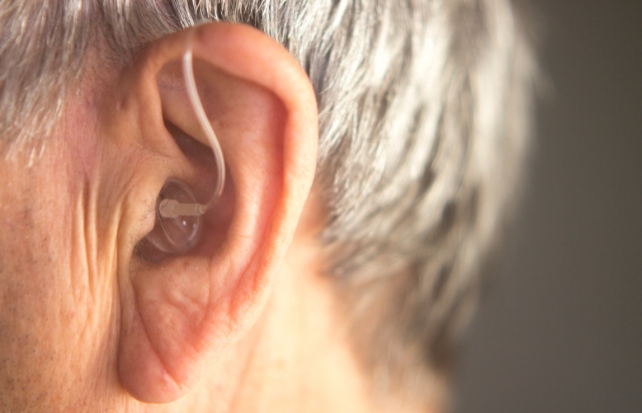Listening to is a ability most of us take without any consideration. However analysis means that adults ought to pay attention out for adjustments of their listening to, as listening to difficulties may be linked to creating dementia at an older age.
In a 2021 research of over 80,000 adults over the age of 60, those that had hassle listening to speech in noisy environments had a better danger of dementia, which is an umbrella time period for situations characterised by reminiscence loss and issue with language and different pondering abilities.
However there’s an upside, too: The research added to proof suggesting listening to issues could not simply be a symptom of dementia however truly a danger issue of dementia that might presumably alert folks, their households, or docs to its onset earlier than any deterioration begins.
“There has been a particular interest in hearing impairment and whether that can increase the risk of dementia,” stated epidemiologist and research writer Thomas Littlejohns of the College of Oxford in July 2021.
“While preliminary, these outcomes recommend speech-in-noise listening to impairment may signify a promising goal for dementia prevention.”
In 2017, listening to loss was listed together with smoking and bodily inactivity as certainly one of 9 main, modifiable danger elements of dementia. That landmark Lancet report was quickly up to date in 2020 to incorporate three extra danger elements, taking the overall to 12. In 2024, a 3rd replace of the Lancet report added one other two, for a brand new whole of 14 modifiable danger elements.
The key phrase there’s modifiable: These danger elements are parts of our way of life and common well being that may be improved, and in that case, could enhance our total well being and scale back the chances of well being situations.
It has been estimated, in these Lancet reviews, that of these dementia danger elements, listening to loss might need the best burden of all – such that individuals with unaddressed listening to loss in midlife are as much as 5 instances extra more likely to develop dementia.
To analyze this, the College of Oxford researchers behind this research tapped into the UK Biobank, a analysis database set as much as tease out the hyperlinks between genetics, environmental elements, and well being outcomes throughout a big chunk of the UK inhabitants.
Dementia danger was analyzed for a bunch of greater than 82,000 ladies and men, aged 60 years or older, who had been free from dementia and had had their listening to assessed firstly of the research.
The members had been examined on their speech-in-noise listening to, which is the flexibility to select snippets of speech in a loud setting – on this case, recognizing spoken numbers towards white background noise.
After 11 years or so, 1,285 members had developed dementia, primarily based on well being data.
“Participants who had worse hearing had almost double the risk of developing dementia compared to those who had good hearing,” stated Littlejohns.
Apparently, about half the folks within the research who had inadequate speech-in-noise listening to, and roughly 42 p.c of those that carried out poorly on the check, did not discover any listening to impairment themselves when requested to report it.
The researchers additionally thought of whether or not folks’s listening to impairments had been truly tied to different elements recognized to affect dementia danger, reminiscent of social isolation and melancholy, each of which could eventuate if folks have hassle listening to.
“But we found little evidence that this was the case,” stated Littlejohns.
Simply to make sure, Littlejohns and his colleagues additionally made some comparisons within the knowledge to see whether or not or not folks’s listening to efficiency could have truly been impacted by underlying, undetected dementia – what’s known as reverse causation.
However the danger of dementia indicated by listening to difficulties was no worse evaluating research members who developed dementia sooner (after 3 years) moderately than later (after 9 years); it remained about the identical.

This wasn’t the primary research to discover a hyperlink between listening to loss and dementia, however the crew stated it was among the many first to analyze dementia danger and other people’s listening to potential in noisy environments, that are extra typical of our on a regular basis.
Equally, prolonged and enormous research from Australia and Taiwan have additionally discovered people who find themselves laborious of listening to have a better danger of dementia. Nevertheless, these research relied on self-reported knowledge from research members, or on medical data denoting listening to loss.
“Large studies like the UK Biobank are powerful tools for identifying genetic, health, and lifestyle factors linked to conditions like dementia,” neuroscientist Katy Stubbs, from Alzheimer’s Analysis UK, a analysis charity, stated of the College of Oxford research. “But it is always difficult to tease apart cause and effect in this type of research.”
Keep in mind, the perfect epidemiological research can do is use associations between environmental elements, well being, and illness, on a inhabitants stage.
“It’s important to bear in mind with this type of study design you can’t infer causality,” stated Littlejohns, “but this adds to the existing literature that hearing impairment could be a modifiable target to reduce the risk of developing dementia.”
Let’s not neglect both, this analysis steered that defending our ears towards listening to harm, with earmuffs and earplugs, and serving to folks hear higher with listening to aids, may probably assist mitigate this potential danger issue of dementia, which impacts tens of millions worldwide.
Too few folks on this specific research had been utilizing listening to aids to achieve any agency conclusions simply but and scientific trials might be wanted earlier than we will say extra. Nevertheless it’s an space of investigation which will provide hope in our understanding and prevention of dementia.
The research was revealed in Alzheimer’s & Dementia: The Journal of the Alzheimer’s Affiliation.
A model of this text was first revealed in July 2021.

